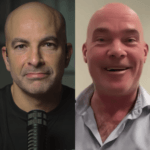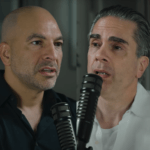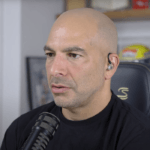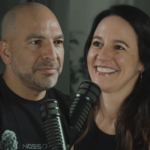In this episode, Ethan Weiss, Hopkins trained preventative cardiologist at UCSF, discusses two topics that on the surface may seem unrelated which is cardiovascular disease, and the role of growth hormone and IGF in disease. Ethan provides a masterclass in everything from acute coronary syndrome to all of the complex nuances around stent placement, as well as how calcium scores and results from CT angiograms shape his treatment of patients. He also shares how his idea to study the sex differences in blood clotting as it relates to coronary disease lead him to pursue the field of endocrinology, and specifically what he found with respect to the effect of growth hormone and IGF on the liver, the brain, and overall human longevity.
Subscribe on: APPLE PODCASTS | RSS | GOOGLE | OVERCAST | STITCHER
We discuss:
- Mutual love for hockey [7:15];
- Ethan’s background and interest in cardiology [13:15];
- Clinical definitions of a heart attack, clotting, and plaque: What causes the acute event? [24:15];
- Defining coronary disease and myocardial infarction: The evolving nomenclature [32:00];
- What happens when someone comes to the ER with a STEMI (ST elevation myocardial infarction)? [47:15];
- Stents [54:45];
- Treatment protocol for both acute and chronic coronary artery disease: History, controversy, and important distinctions [1:06:30];
- Using stents to treat stable angina: What we learned from the COURAGE AND ORBITA trials [1:15:30];
- The “art” of longevity: The challenge of preventative medicine and understanding risk [1:31:45];
- Understanding CAC scores, and CT angiogram results [1:40:15];
- How sex differences in clotting and heart disease got Ethan interested in growth hormone and IGF [2:01:00];
- Impact of growth hormone on the liver [2:07:00];
- Growth hormone and insulin sensitivity [2:18:00];
- The role of GH and IGF on chronic disease and cancer [2:23:30];
- Will taking growth hormone promote longevity? [2:32:30];
- GH and IGF as a treatment for early stage dementia? [2:34:30];
- What happens to IGF while fasting and what about fasting improves longevity? [2:35:15];
- The importance of becoming scientifically literate and making science more exciting for future generations [2:38:30];
- Ethan’s new company: Keyto [2:43:45]; and
- More.
Mutual love for hockey [7:15]
- Wayne Gretzky (Ethan owns a signed Edmonton Oilers jersey)
- Chicago Blackhawks (first game Ethan ever attended in 1979 with his father)
- Washington Capitals (Ethan’s favorite team)
- New York Islanders (beat the Oilers for the Stanley Cup in 1983)
- When Peter was 10-years old he asked for cash for his birthday so he could by a Gretzky jersey (he went with a Oilers home jersey)
- Toronto Maple Leafs (Peter’s hometown team that he never really loved)
- Mark Messier (Former Edmonton Oiler that Peter got to have dinner with recently)
- Northlands Coliseum (former home of the Oilers)
Ethan’s background and interest in cardiology [13:15]
- Ethan “grew up in the hospital”
- Ethan’s father is a cardiologist at Johns Hopkins
- Ethan eventually went on to complete med school and residency on Johns Hopkins
- Now a cardiologist at UCSF since 1998
Did he always want to do medicine?
- No, actually was uninterested in science until happenstance
- Went to Vassar to study music but fell for science after taking a class that piqued his interests
Med school at Johns Hopkins
- Surrounded by incredibly smart people
- One of the only non “hard science” students
- Hopkins was an intensely challenging environment but his fellow classmates were really supportive
- Classmates: David Sabatini, Dave Brett, Andy Cameron
- “Going to med school at Hopkins in that era was like playing for the Yankees.”
- Peter and Ethan both fondly recall “Sunday School” and being critiqued by famous surgeon John Cameron
- Hopkins in the 1990s was some of the hardest times
- you’d stay up all night taking care of patients
- basically did nothing but sleep or be in the hospital
- A lot of active HIV disease at the time which is basically ICU level care and only people there were you and 2 other residents
- “You look back on it and you think, ‘I don’t know how I survived it,’ but in retrospect it was really fun.”
How did he pick cardiology?
- His intention was to avoid it as to not follow his father exactly
- But he became extremely fascinated when a series of patients in their late 30s, early 40s, who had myocardial infarction (heart attack) yet they were relatively absent any obvious risk factors
- Decided he wanted to study the pathogenesis of unstable antigen (or MI) in young people without risk factors
- Worked in the lab of Pascal Goldschmidt and it was that experience which was a “career defining for me, that drove my clinical interest”
Clinical definitions of a heart attack, clotting, and plaque: What causes the acute event? [24:15]
- 99% of heart attacks in this country happen because of a ruptured atherosclerotic plaque
- Many people mistakenly believe …
{end of show notes preview…}

Ethan Weiss, M.D.
Dr. Ethan Weiss is a cardiologist specializing in general cardiology. His special interests include preventive cardiology, genetics of coronary disease, risk assessment, and heart disease in the young.
In his research, Dr. Weiss uses genetic models to better understand the mechanism of metabolic disorders such as obesity, fatty liver disease, and diabetes. He also studies the blood clotting system and has interest in identifying novel ways to safely block clots associated with diseases such as heart attack and stroke without causing an increase in bleeding.
M.D., 1996 – School of Medicine, Johns Hopkins University
Clinical Fellowship, – School of Medicine – Cardiology, University of California, San Francisco
Follow Ethan on Twitter: @ethanjweiss






What is the “Starry Pathology Book” Peter mentioned in this podcast? A half-hour web search turned up nothing.
Thank you!
Hi, I was also trying to find this reference. Have you had any luck since this post?
Thanks
Hey Johnny! Here’s the book! It’s a pathology book but technically the title uses the word “atlas” which makes it difficult to search. https://www.amazon.com/Atherosclerosis-Progression-Regression-Encyclopedia-Medicine/dp/1842141538
Regarding the 2h mark, how men might have evolved for more wound-healing.. and women, to protect the offspring, are optimized with a lower immune response.. doesn’t the data show exactly opposite.. i.e. women get far more autoimmune diseases than men?
wasn’t berkeley heart lab bought by Quest?